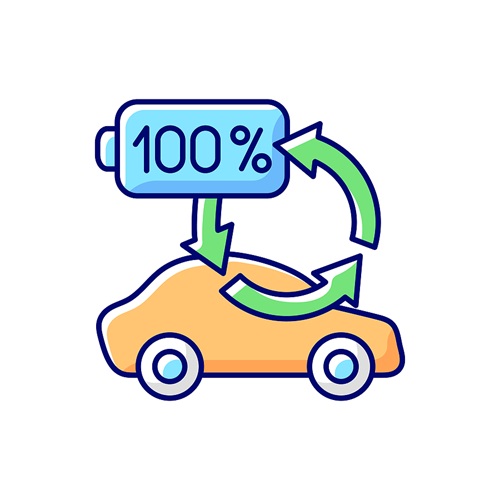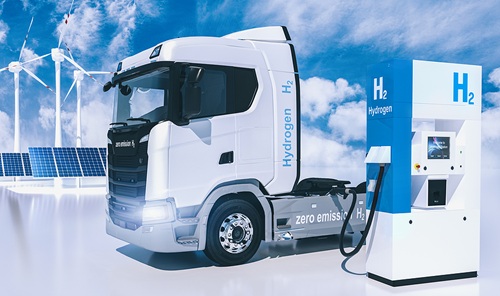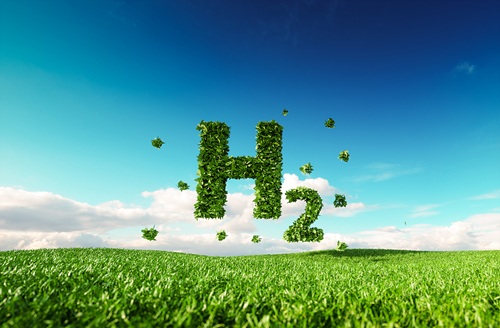In theory, we’re all going electric. Time and again, it’s been shown that the most efficient way to power a car is to take electricity from renewable sources wind, solar, hydropower and put it straight into a battery.
That way you have the fewest losses of efficiency along the way: plug in, charge up, drive off. It’s why EVs can use more than 90% of the electricity that goes into them, an efficiency no other technology can match. For comparison, even a really efficient petrol-hybrid will waste around 60% of its fuel as heat before the wheels even turn.
So EVs win, then? Well… not so fast. There’s a honking great elephant in the room: infrastructure. Here in Ireland, we have electricity everywhere, but the rollout of chargers has been agonisingly slow. And while charging times are getting faster, most EVs still need to sit around for hours to fully recharge.
Wouldn’t it be simpler if you could just fill up with a clean fuel in five minutes, the way we’ve done with petrol and diesel for decades? That’s the promise of hydrogen; abundant, clean at the tailpipe, futuristic-sounding. But between promise and reality, there are a lot of catches.
Electric vs Hydrogen Cars
- Efficiency: EVs use 90% of the electricity generated, while hydrogen cars lose significant energy during production and transport.
- Refuelling & Range: Hydrogen cars refuel in 5 minutes and often exceed 500 km per tank; EVs now achieve 400+ km with fast charging in 20 minutes.
- Infrastructure: EV charging is widespread and growing fast; hydrogen refuelling stations remain scarce and costly.
- Costs: Running an EV is far cheaper than filling with hydrogen fuel.
- Outlook: EVs dominate the passenger market, while hydrogen may find niche roles in heavy transport, fleets, and remote regions.

Why Electric Cars Lead in Efficiency
EV Energy Conversion
Battery-electric cars are unrivalled in efficiency. Electricity flows from the grid into the battery and powers the wheels directly. Around nine-tenths of what’s generated ends up moving the car. That’s unbeatable efficiency.
Comparison With Petrol & Hybrids
A petrol-hybrid, at best, manages around 40% efficiency. The rest goes up as heat, and that’s before factoring in the energy cost of pumping oil out of the ground, refining it, and trucking it to filling stations. On this measure, EVs look unbeatable.
How Hydrogen Cars Work
Hydrogen cars take a different path. They store compressed hydrogen in carbon-fibre tanks, then combine it with oxygen in a fuel cell. That chemical reaction generates electricity to drive the motor — and the only emission is water vapour that’s so clean, you could catch it in a glass and drink it.
On paper, that’s brilliant. The Toyota Mirai, for example, can travel around 600 km on a single tank and refuels in minutes. In terms of convenience, it feels like the best of both worlds: clean and quick.
The Infrastructure Challenge

Here in Ireland, electricity is everywhere, but a reliable charging network is not. Too often, EV drivers find chargers broken, busy, or simply not powerful enough. Home charging is convenient if you have a driveway, but not much use for apartment dwellers or long trips.
Yes, fast-charging hubs are improving, the best can deliver 10–80% charge in under 20 minutes, but they’re patchy, expensive to build, and still slower than pumping liquid fuel.
Hydrogen, in theory, avoids this. Five minutes at a pump and you’re good to go. But there’s a problem: there are currently no public hydrogen stations in Ireland. Without a massive infrastructure push, that advantage remains purely theoretical.
The Efficiency Problem With Hydrogen
This is the big sticking point. Making hydrogen isn’t free. First you need electricity to split water into hydrogen and oxygen (electrolysis). Then you need to compress it, ship it, and store it safely. Each stage throws away energy.
By the time the hydrogen makes it into your tank, you’ve wasted so much electricity that you’d have been better off sending it directly into a battery. That’s why critics call hydrogen “the long way round.”
Industry Perspectives
Toyota’s Gill Pratt on Lithium Supply

Toyota’s Chief Scientist, Dr. Gill Pratt, is blunt about the challenges ahead. Speaking at the World Economic Forum in Davos, he warned that lithium, the essential ingredient in EV batteries, may run short. The International Energy Agency estimates there could be a supply gap of up to 50% by 2040. The problem is that opening new lithium mines can take more than a decade, while battery factories can be built in just two years. In other words, we may be able to build EV factories much faster than we can secure the raw materials to supply them.
Pratt’s argument? Don’t put all your lithium into a few big batteries. Spread it across hybrids, plug-in hybrids, and hydrogen cars instead, and you’ll cut fleet-wide emissions faster. Toyota plans to make 3.5 million BEVs annually by 2030 but it isn’t betting the farm on batteries alone.
BMW’s Hydrogen Trials in South Africa
BMW is testing its iX5 Hydrogen SUV in South Africa, a country with vast distances and limited EV charging infrastructure. The company sees hydrogen as a way to store excess renewable energy, such as solar and wind, and use it later to power vehicles in places where the grid is unreliable. This approach also connects with Germany’s recent deal to import green hydrogen from Namibia, showing how hydrogen could become part of global trade in clean energy. It’s a glimpse of how global hydrogen trade might one day look though Ireland, for now, is far from that picture.
Hyundai and Kia: Betting Big on Fuel Cells
Hyundai and Kia remain committed to hydrogen. Hyundai’s Nexo SUV is one of the few hydrogen cars available to buy today, and the company is investing heavily in hydrogen-powered buses and trucks across Europe and Asia. The appeal is clear: for heavy vehicles and fleets, every minute off the road costs money. Because hydrogen refuels as quickly as petrol or diesel, it could be an attractive solution where battery charging times are a problem. For Ireland’s bus and haulage operators, this could one day be a practical option but only if hydrogen refuelling stations are built.
The Irish and European Context
Ireland has so far focused on EVs, with grants for buyers and investment in public charging, but hydrogen is still part of Europe’s long-term plans. The EU’s Hydrogen Strategy aims to install 40 gigawatts of electrolysers, machines that split water into hydrogen and oxygen, by 2030. To put that in perspective, it would be enough to produce millions of tonnes of hydrogen a year from renewable power. For Ireland, hydrogen could become useful in freight corridors, ports, or as a way to store excess offshore wind energy. But right now it remains potential rather than reality.
Motorsport and Niche Performance Uses
Motorsport is also experimenting with hydrogen. Alpine and Toyota are testing race cars that burn hydrogen directly in modified engines, rather than using fuel cells. These cars emit only water vapour instead of CO₂. You won’t see this on Irish roads anytime soon, but racing has often been a testing ground for new technology, from turbocharging to hybrid systems. Hydrogen racing could play a similar role in shaping future engineering.
The Road Ahead for EVs and Hydrogen Cars

Governments worldwide including Ireland’s have already committed billions to EVs. Charging networks are being built, subsidies are flowing, and consumer adoption is climbing fast. Switching tracks to hydrogen now would mean scrapping all that progress and starting again.
Hydrogen, as both a fuel and a driver of economic progress, seems like a magic bullet, but actually getting it to work on a mass basis that’s affordable and genuinely ‘green’ is hard. For now, it seems that batteries have already won the war. However, as history shows us, things have a habit of changing and hydrogen power for cars may yet find its place.
Drive Into the Future with Confidence
If you’re considering a second-hand car, whether it’s a battery-electric model, a hybrid, or even future technologies like hydrogen one thing never changes: you need to know the full history before you buy.
A MotorCheck car history report gives you peace of mind when buying used. It reveals mileage records, previous ownership, finance checks, and whether the vehicle has ever been written off or stolen. This is just as important for EVs and hybrids as it is for petrol or diesel cars.
Get your MotorCheck report today and make your next second-hand car purchase in Ireland with complete confidence.
FAQ: Electric vs Hydrogen Cars
Will hydrogen replace electric cars?
Hydrogen is unlikely to fully replace electric cars, but it could complement them. Battery-electric vehicles already dominate sales, infrastructure, and efficiency, so they will remain the main option for most drivers. However, hydrogen may still play a role in heavy transport, long-distance travel, and regions with weaker charging networks.
Is a hydrogen engine better than EV?
A hydrogen car and an electric vehicle each have their own strengths. Hydrogen fuel cell cars refuel in just a few minutes and can travel long distances of up to 600 km on a single tank, making them convenient for drivers who need range and speed. Electric vehicles, on the other hand, are far more energy-efficient, cheaper to run, and supported by a rapidly expanding charging network. Which is “better” depends on whether you value fast refuelling and range (hydrogen) or efficiency and lower running costs (electric).
What is the major downside of hydrogen power?
The major downside of hydrogen power is inefficiency. Producing, compressing, and transporting hydrogen consumes a lot of energy, so less of the original electricity ends up powering the car compared with simply charging a battery. However, supporters argue that hydrogen can still be valuable as a way to store surplus renewable energy and provide quick refuelling for long-distance travel, buses, and heavy vehicles where batteries may not be practical.
Do hydrogen cars have better range than EVs?
Hydrogen cars typically have a better range than EVs today, with some models like the Toyota Mirai reaching around 600 km on a single tank. However, modern EVs are catching up, with many now offering 400+ km ranges and ever-faster charging.
Why aren’t hydrogen cars more popular?
Hydrogen cars are not popular mainly because the infrastructure to make, transport, and refuel hydrogen is almost non-existent, and building it is hugely expensive. In Ireland, for example, there are currently no public hydrogen refuelling stations. However, hydrogen does offer advantages that keep interest alive — it provides fast refuelling and long range, which some manufacturers believe could make it ideal for heavy vehicles, buses, and countries with limited charging networks.
Is hydrogen cleaner than electric?
Hydrogen is not automatically cleaner than electric cars. Producing hydrogen requires large amounts of energy, and unless it is made using renewable power, it is not truly “green.” Electric vehicles, which use electricity directly, are generally the cleaner choice today. However, hydrogen could become much cleaner in the future if more of it is produced from renewables, and it offers potential as a way to store excess wind and solar energy that might otherwise go to waste.